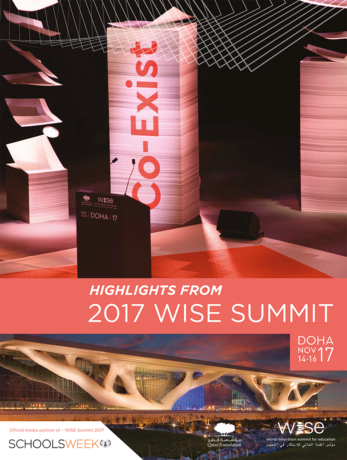Schools Week senior reporter Alix Robertson was joined at WISE 2017 by Tom Sherrington, an author and former headteacher with nearly 30 years’ experience in schools.
Tom became a reporter in his own right for the two-day conference, attending sessions and carrying out interviews with delegates from different countries and areas of education.
You can read all about his encounters on pages four, six, 10 and 11, and find two insightful blogs he has written at the conference at www.schoolsweek.co.uk.
And if you have any time left over, you can also check out his book, The Learning Rainforest.
Alix and Tom
On November 15 and 16 Schools Week went global, flying out to Doha in Qatar, to cover the World Innovation Summit for Education 2017.
The event was a departure from our usual UK stomping grounds, but yielded a wealth of interesting ideas and insights about teaching and learning from around the world.
We kick off with our coverage on page three, where you can find out about the history of WISE and hear chief executive Stavros Yiannouka’s views on this year’s event.
Page four introduces you to the first in a series of interviews with Tom Sherrington and some of WISE’s top attendees – the rest can be found on pages six, 10, and 11.
The opening ceremony discussion, on ‘Education in a post-truth world’, is explored on page five, along with a panel debate on ‘Teachers: transforming roles in changing times’, chaired by the multi-talented Mr Sherrington himself.
Then on page seven, Sir Michael Barber, a former advisor to Tony Blair, sheds light on what it takes to deliver successful reform in education systems.
Page seven also delves into the world of behavioural science, exploring how “nudges” can be used to encourage positive choices in education.
On pages 12 and 13 you can read about the incredible projects that scooped a WISE Award this year, and also find out who topped them all by winning the WISE prize for education 2017.
WISE commissions new research into education every year, and the 13 papers produced for the 2017 summit are explored on page 14.
Also on page 14, the closing ceremony wraps up with a debate on the importance of valuing knowledge in modern society.
And finally on page 15, delegates tell you all about their experiences at the event.
Thanks for reading!










Useful supplement, just am so disappointed that this is titled ‘Highlights from 2017 Wise Summit’ rather than ‘WISE: After the Event’ #justsaying 😉
Just picking up on Sir Michael Barber – actually is there any evidence his reforms were of value?
#Justsaying
On 11.11.88 the old TES published an almost guaranteed strategy for helping children be literate: A decade or more earlier Bullock had offered a similar well-argued prescription. Why is it still a problem now needing tests, targets and inspection? Cockroft gave WISE guidance on Maths., Maud on the Arts- both still major problems facing national education.Who has heard of Clegg or Galton or even John Locke today, purveyors of hard truths about what works?
Why are summer-born still disadvantaged in ultimate performance? Why does it take the IFS of all bodies to expose it again?
Why does policy insist on system changes, invariably expensive, when Hattie’s widely gathered evidence of what abundant research finds actually works shows people more effective?
How meaningless contradictory strategies about helping teachers be effective?How will RA’s formidable Primary Review stay unforgotten when solid Plowden truths of 50 years ago are barely examined today despite colouring, unacknowledged, reference in other comment?
How have well-founded criticisms of grammar schools and streaming been forgotten?
Why have PWC disowned exam results when recruiting? Why did only 14% of employers in 2010 say they looked at certificates when recruiting?
Why have fifty years been but a roundabout of ever-returning problems?
How does this relate to “Give me the child until he is seven?”
Not sure it’s so much about being WISE after the event, though empathise with that- more like has anything that changed the system ever done much good?
Meanwhile who saw in the FT the piece about technology working to make the brain obsolete? Or Hawking’s warning last year about the end of humanity if AI gets where some want it to? Is anyone WISE enough to see where that is leading for the key players of long-term WISE practice- namely those born today? That 1988 report, like the Jesuit priest 200 years ago, had the bones of an answer to all these matters but, as much else, little developed. We are too locked into our WISE strait-jacket-respectable but insufficient.